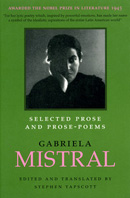
Chilean poet Gabriela Mistral (1889-1967) won the Nobel Prize for Literature in 1945, and had a long and distinguished career as a poet and educator. This volume brings together work for which she is, on the whole, less famous—her prose-poems and prose.
Prose poems are interesting beasts. Formatted like prose, but with the compressed and heightened language of poetry, they live near the prose-poetry boundary, and sometimes have one foot on each side of that ill-policed border. As a reader, I enjoy prose poems when they are sprinkled through a poetry collection, but an entire volume of prose poems wouldn't be my first choice.
I stopped worrying about that when I read the first section of the book, "Fables, Elegies and Things of the Earth". These poems take ordinary things of the world—the pineapple, the tortoise, bread—and elevate them into marvels with playful wit and vivid imagery. This is among the very best nature poetry I've read.
While none of the remaining sections made quite the same impact on me, it may be that I am not the primary audience for these poems of childbirth, motherhood and religious devotion. What strikes and inspires me most about the poems throughout this collection is their wonderfully vivid and economical imagery, underpinned by a sharp intelligence.
The final section of the book consists of essays on teaching, on Chile, on writers Gabriela Mistral has known and admired. Although these are formally on the "prose" side of the boundary, these short essays have the same hallmarks as her poetry, and had me noting down the names of more writers to investigate.
This book prints the Spanish-language originals followed by Stephen Tapscott's translations into English. My favourite arrangement in dual-language poetry books is for the source language to be on the left and the translation on the right, which makes it easier to look directly across from one to the other, but this may have been difficult to achieve for the longer prose pieces.
Any translation needs to find a balance between fidelity to the source language and fluid expression in the target language. As to the second, the English versions read very well, and could stand alone as English-language pieces; as to the first, I didn't spot any obvious mis-translations in the few pieces I examined in detail, but it would take someone whose Spanish is much better than mine to say how well Stephen Tapscott has captured all the nuances of Gabriela Mistral's originals.
So, if you like poetry, my advice is to put away any reservations you might have about prose poems and read this
collection. Though it might not all be to your taste, I think there will be poems and images here that will linger
with you long after you close the book.

University of Texas Press, paperback, 9780292752665
